China Digital
“Daddy Ma, Are You OK?” – Jack Ma’s Situation Discussed on Chinese Social Media
Public sentiments on Jack Ma have shifted, but the fans still defend their idol.
Published
4 years agoon

Chinese tech superhero Jack Ma has become a hot topic on international social media this month since he has been missing in action for weeks, while Alibaba is facing an anti-monopoly investigation. Ma seems to have fallen out of favor, not just with authorities but also with many Chinese web users.
This month, the alleged ‘disappearance’ of Alibaba founder Jack Ma made headlines in various English-language media, from Reuters to CNN and the Financial Times.
The direct reason for speculation about Jack Ma’s whereabouts was his absence at Africa’s Business Heroes, a talent show he helped create in which Ma was part of the finale judge panel. According to FT.com, the final – which won’t be broadcasted until spring – took place in November.
Although an Alibaba spokesperson explained Ma’s absence from the show as a “schedule conflict” that made it impossible for the tech tycoon to participate, many Twitter users directly tied his ‘suspected missing’ to a critical speech he gave at the Shanghai Bund Finance Summit on October 24 of 2020.
In this speech, Ma made critical remarks on how China’s financial market is regulated and supervised. Kevin Xu at Interconnected provides an English translation of this speech here.
On November 3rd, two days before Alibaba’s fintech subsidiary Ant Group was set to raise around $37 billion with the biggest initial public offering of all time, Chinese regulators abruptly suspended the process. A report by the Wall Street Journal claimed that Chinese President Xi Jinping personally made the decision to halt the IPO of Ant Group after years of rising tensions between Ma and the government.
Pressure on Jack Ma and Alibaba further increased in December when Chinese regulators launched an anti-monopoly investigation into Alibaba and the Ant Group.
Alibaba announced the investigation of its company on its official Weibo channel on December 25 of 2020.
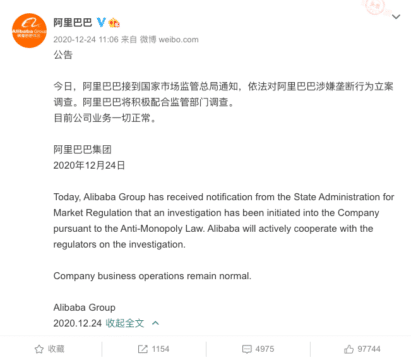
On December 25, People’s Daily also reported the anti-monopoly investigation. The state newspaper hosted a hashtag page about the matter on Sina Weibo (#人民日报再评阿里巴巴被调查#) which garnered over 240 million views. They wrote:
“Large Internet platform companies should take the lead in strengthening industry self-discipline, in further enhancing their sense of social responsibility, and in safeguarding a favorable Internet economic ecosystem. The Internet industry has never been, and should never become, a place that is outside the law for anti-monopoly. Regarding platform economy, reinforcing anti-monopoly regulations is never a “winter” for the industry – it is just a new starting point for better and healthier development.”
Although Chinese official media have since not reported much on the issue, and have not published about Ma’s alleged ‘disappearance’, Ma’s whereabouts and his situation has become a much-discussed topic on various Chinese social media platforms.
Jack Ma in Short
Being among the top 20 richest people in the world, Jack Ma is world-famous as the founder of Alibaba, a multinational tech company specializing in e-commerce that was founded in 1999.
Jack Ma, whose Chinese name is Ma Yun 马云, was born in Hangzhou in 1964 to a family of low status. His life story has been retold in many books. Ma was bullied at school, had poor math skills, and flunked the entrance exam twice before he was accepted into the Hangzhou Teacher’s Institute, where he graduated in 1988 with a Bachelor of Arts in English.
Ma had been interested in English since he was a young boy. He would cycle to the main hotel in his city to connect with foreign tourists, acting as their local tour guide in return for English classes. The name ‘Jack’ was given to him by one of the tourist friends he made at that time.
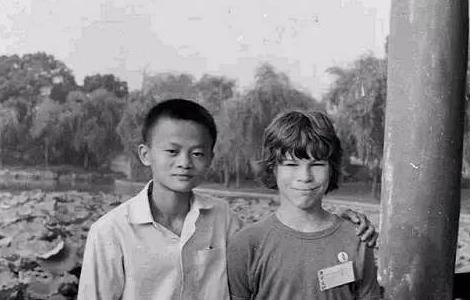
image via kknews.cc
Ma went on to become an English teacher and barely even touched a keyboard before he traveled to the US in 1995 as an interpreter. It was during this trip that he was first introduced to the internet, after which he became inspired to set up his own commercial web site in China – a web site named ‘China Pages’ for Chinese businesses.
Although that business flopped, Jack Ma founded Alibaba in 1999, which would turn into an internet giant influencing virtually all corners of China’s digital world. The Alibaba Group now operates numerous businesses, including Taobao, TMall, AliExpress, and the Ant Group.
Ma’s success is a source of inspiration to many, and his ‘crazy Jack’ energetic behavior and willingness to make fun of himself has only made him and his story all the more captivating.

A younger Ma in one of his fun song-and-dance appearances – as Snow White.
Ma officially stepped down as Alibaba’s CEO in 2019 but is still the company’s largest individual shareholder.
“What’s up with Ma Yun?”
Until recently, Jack Ma was one of the more popular Chinese celebrities on social media. Jack Ma quotes, memes, videos, or stories would frequently go viral.
As one of the most respected and powerful entrepreneurs of China, bookstores have entire sections dedicated to Jack Ma and his role as a business magnate, the richest man of China, and also as a welldoer and an inspiring influential.

Books about Jack Ma.
Whatever Ma would say or do would go trending, with many people praising what he did, what he said, or where he went.
In 2017, the meeting between US President Trump and Alibaba’s Ma was a big topic of discussion, with many Chinese web users taking pride in Ma’s meeting with Trump, calling him the perfect ambassador to China in their dealings with Trump. “Ma Yun [Jack Ma] for president!” was a much recurring phrase.
It is a phrase you won’t read as much, if at all, on Chinese social media these days anymore. The silence surrounding Jack Ma recently has led to speculation and reflections on his current situation.
On Chinese search engine Baidu, the search prediction reflects web users’ confusion over his whereabouts; upon searching for ‘Ma Yun’ in the first week of January, the first five automatic predictions are the following:
– Jack Ma fled abroad
– Did Jack Ma really flee abroad?
– Jack Ma sentenced to prison
– Jack Ma disappeared
– Jack Ma Shanghai Bund speech
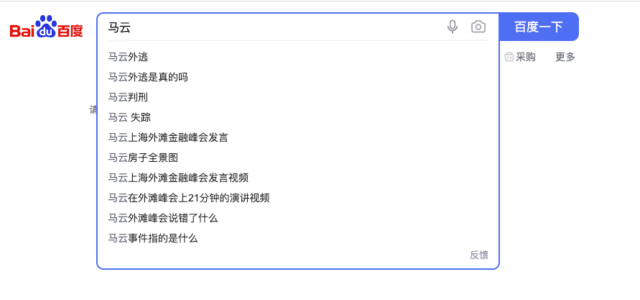
On Douyin (the Chinese TikTok), the first sentence to come up when searching for Ma Yun, is “What’s up with Ma Yun?”

On Weibo, where Jack Ma has over 26.4 million followers on his official account, there have not been any new posts since October 17. But Ma’s last post, which talks about an educational event, is still attracting new comments every few minutes.

“Daddy Ma, come on, ok? We’re rooting for you,” one commenter writes.
“We haven’t seen you in a long time, Brother Ma,” some write: “When will you come back into the public arena?”, with others saying: “Teacher Ma, what happened?”
But besides the messages from those who seem concerned about the well-being of the tech tycoon, there are many angry ones.
Some blame Ma for praising the ‘996’ work system (working from 9am-9pm, 6 days a week). In 2019, Ma called the 12-hour working day a “blessing,” causing much controversy online. Because the death of a young employee at Pinduoduo was also linked to her long working hours, the ‘996’ work system is a hot topic this week, with many condemning how Chinese tech companies are exploiting their employees and revisiting Ma’s 2019 comments.
Others also turn to Jack Ma’s Weibo page to complain about the shutdown of Alibaba’s music streaming app Xiami. Although Xiami only holds a small percentage of China’s music streaming market – apps such as QQ Music and KuGou are more popular – there are still many people who have been using the app for years and hate to see it go: “Why can’t you give it another chance, why can’t you take care of our Xiami!?”
And then there are those commenters who, in light of the recent developments and anti-monopoly investigations, call Ma a “greedy capitalist” and a “bloodsucker.” “Maybe he’ll be punished,” one person writes: “Is that a ‘blessing’ too?” “I went from being a fan to a hater,” another commenter writes, with others calling him an opportunist.
Changing Sentiments on Social Media
Jack Ma used to be an idol for many young people in China, but now it seems they have started to oppose him. On the Chinese video sharing site Bilibili, mainly used by younger generations, comments appearing in some videos featuring Ma are filled with anger and scolding.
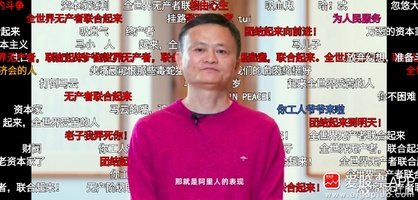
This shift in Ma’s popularity among young people was recently also explained by young Chinese vlogger Yu He in this video, who argues that young people do not adore Jack Ma in the same way older Chinese people do.
Ma’s vision of working really hard, praising the ‘996’ work culture, and “everybody can be successful if you really try hard” was an inspiration to previous generations, but many post-90s people in China today – who are struggling in a highly competitive job market – do not have a lot of faith in Ma’s work philosophy when their everyday lives are not about working to live, but about living to work. To them, Ma’s ideas about working around the clock to get further in life do not make sense, as some feel they are working themselves to death while others get rich.
There is also anger over consumer lending platform Huabei, a product of Alibaba’s Ant Group. Huabei previously encouraged users to spend more money in its ads, and its platform makes it very easy to spend money first and pay it back later – even for those who might not oversee the long-term consequences of excessive debt.
The question of why Jack Ma seems to have fallen out of favor with many Chinese people is also a topic of discussion on question-and-answer platform Zhihu.com.
One popular analysis by the e-commerce account Zhiser claims that Jack Ma used to be supported by the ordinary people because he made it possible for so many of them to make money through the Taobao marketplace platform, which started in 2003. Alibaba’s Alipay online payment platform made it possible for common people to conveniently transfer money without extra fees.
But over recent years, Zhiser argues, Alibaba’s business strategies have changed in such a way that its own profits are maximized and small sellers are negatively impacted.
With the arrival and growth of Alibaba’s Tmall, where only brand owners or authorized dealers can open an online store & where transaction commissions are much higher, the traffic of small sellers on the Taobao marketplace has been reduced. Alibaba’s activities are increasingly focused on benefiting the bigger companies – and itself -, while small entrepreneurs are increasingly struggling to be noticed and make money.
Without the means to open their own Tmall shop, without the capital to afford advertisement and paid promotions for their shops, the small sellers are watching helplessly how the big boys dominate the platform algorithms and take the money, Zhiser explains.
Alibaba is now also increasingly focusing on the fruit & vegetable market. There’s Alibaba’s Hema Fresh supermarket brand, for example, with big plans to open hundreds of stores nationwide in the upcoming years. The rise of Alibaba’s fresh food businesses directly impacts the livelihood of ten thousands of ordinary Chinese who have their own small vegetable shops or street stalls – exactly those people who are already in vulnerable social groups.
Although the rise of Alibaba was once a great opportunity for common people, the changing business strategies have now resulted in Jack Ma getting more enemies, including small entrepreneurs, small sellers and buyers, offline shops, offline vendors, etc.
For them, the ‘Alibaba dream’ of using the power of the Internet and technological advancement to enable small businesses and young people to share the benefits of free trade has lost credibility.
“These years, Jack Ma has played the role of the destroyer rather than the savior,” the author writes. His article received over 10,500 endorsements.
Zhiser’s article reflects a perspective that surfaces in many places. “We believed him, that he really was making things better for us,” another blogger writes.
Others think that Jack Ma was true about his intentions and dreams when he was a teacher and then started his business, but changed when he became surrounded by money-driven big investors, causing him to become alienated from his former ideas and philosophies, losing touch with China’s younger generation, the small shop owners he promised to serve and the ordinary people.
“He changed China, he changed the world”
Despite the recent criticism of Ma, many people still defend and support him. There are even those who criticize him but still express their admiration for him.
Regarding the criticism coming from post-90s generations, one Chinese web user commented:
“You have no idea what it was like before Jack Ma came around. You’re too young to know. If you want to go back [in that time], I suggest you go live on the moon.”
Discussing the changing sentiments regarding Ma, Zhihu author Qing Rui writes:
“Jack Ma is a great entrepreneur of this era. He changed China, he changed the world. A lot of nonsensical people scold him for damaging China’s real economy, while he’s actually worked hard to improve the efficiency of the business sector, which has not only greatly boosted the real economy, but also greatly improved the living standards of the Chinese people.”
It is a sentiment shared by many, who express that they think the recent shift in views on Ma is uncalled for, or reminding people of the positive effect Ma and his businesses have had on China’s development.
“Those who scold Jack Ma are brainless idiots,” some write.
“How is it possible for the public opinion on Daddy Ma shifting 180 degrees? It’s like throwing stones at someone who fell down,” one Weibo user from Shenyang writes.
Although perhaps less crowded than before, online ‘Ma Yun Fanclubs’ are still active. One Weibo fan writes: “Let’s all hope our favorite idol Ma Yun will smoothly sail through this crisis!”
As for the ‘disappearance’ of Jack Ma that has previously been reported – although Ma has not been out in public, it is highly unlikely that he is actually missing.
CNBC reported on January 5 that the Chinese billionaire is lying low, according to a person familiar with the matter.
When famous Chinese actress Fan Bingbing got caught up in a tax evasion scandal in 2018, her ‘disappearance’ also made headlines in international media. After months of silence and wild rumors, the actress returned to social media with a public apology. She was ordered to pay taxes and fines worth hundreds of millions of yuan.
Meanwhile, Jack Ma’s Weibo page is still receiving dozens of new messages. In between the “evil capitalist” scoldings, there are some who really hope Ma will come back to public life soon: “We’ll support you, teacher Ma, don’t give up!”
By Manya Koetse
Follow @WhatsOnWeibo
Spotted a mistake or want to add something? Please let us know in comments below or email us. First-time commenters, please be patient – we will have to manually approve your comment before it appears.
©2021 Whatsonweibo. All rights reserved. Do not reproduce our content without permission – you can contact us at info@whatsonweibo.com.
Manya is the founder and editor-in-chief of What's on Weibo, offering independent analysis of social trends, online media, and digital culture in China for over a decade. Subscribe to gain access to content, including the Weibo Watch newsletter, which provides deeper insights into the China trends that matter. More about Manya at manyakoetse.com or follow on X.

China Arts & Entertainment
How K-pop Fans and the 13-Year-Old Daughter of Baidu VP Sparked a Debate on Online Privacy
What began as K-pop fan outrage targeting a snarky commenter quickly escalated into a Baidu-linked scandal and a broader conversation about data privacy on Chinese social media.
Published
3 weeks agoon
March 26, 2025By
Ruixin Zhang
For an ordinary person with just a few followers, a Weibo account can sometimes be like a refuge from real life—almost like a private space on a public platform—where, along with millions of others, they can express dissatisfaction about daily annoyances or vent frustration about personal life situations.
But over recent years, even the most ordinary social media users could become victims of “opening the box” (开盒 kāihé)—the Chinese internet term for doxxing, meaning the deliberate leaking of personal information to expose or harass someone online.
A K-pop Fan-Led Online Witch Hunt
On March 12, a Chinese social media account focusing on K-pop content, Yuanqi Taopu Xuanshou (@元气桃浦选手), posted about Jang Wonyoung, a popular member of the Korean girl group IVE. As the South Korean singer and model attended Paris Fashion Week and then flew back the same day, the account suggested she was on a “crazy schedule.”
In the comment section, one female Weibo user nicknamed “Charihe” replied:
💬 “It’s a 12-hour flight and it’s not like she’s flying the plane herself. Isn’t sleeping in business class considered resting? Who says she can’t rest? What are you actually talking about by calling this a ‘crazy schedule’..”

Although the comment may have come across as a bit snarky, it was generally lighthearted and harmless. Yet unexpectedly, it brought disaster upon her.
That very evening, the woman nicknamed Charihe was bombarded with direct messages filled with insults from fans of Jang Wonyoung and IVE.
Ironically, Charihe’s profile showed she was anything but a hater of the pop star—her Weibo page included multiple posts praising Wonyoung’s beauty and charm. But that context was ignored by overzealous fans, who combed through her social media accounts looking for other posts to criticize, framing her as a terrible person.
After discovering through Charihe’s account that she was pregnant, Jang Wonyoung’s fans escalated their attacks by targeting her unborn child with insults.
The harassment did not stop there. Around midnight, fans doxxed Charihe, exposing her personal information, workplace, and the contact details of her family and friends. Her friends were flooded with messages, and some were even targeted at their workplaces.
Then, they tracked down Charihe’s husband’s WeChat account, sent him screenshots of her posts, and encouraged him to “physically punish” her.
The extremity of the online harassment finally drew backlash from netizens, who expressed concern for this ordinary pregnant woman’s situation:
💬 “Her entire life was exposed to people she never wanted to know about.”
💬 “Suffering this kind of attack during pregnancy is truly an undeserved disaster.”
Despite condemnation of the hate, some extreme self-proclaimed “fans” remained relentless in the online witch hunt against Charihe.
Baidu Takes a Hit After VP’s 13-Year-Old Daughter Is Exposed
One female fan, nicknamed “YourEyes” (@你的眼眸是世界上最小的湖泊), soon started doxxing commenters who had defended her. The speed and efficiency of these attacks left many stunned at just how easy it apparently is to trace social media users and doxx them.
Digging into old Weibo posts from the “YourEyes” account, people found she had repeatedly doxxed people on social media since last year, using various alt accounts.
She had previously also shared information claiming to study in Canada and boasted about her father’s monthly salary of 220,000 RMB (approx. $30.3K), along with a photo of a confirmation document.
Piecing together the clues, online sleuths finally identified her as the daughter of Xie Guangjun (谢广军), Vice President of Baidu.
From an online hate campaign against an innocent, snarky commenter, the case then became a headline in Chinese state media, and even made international headlines, after it was confirmed that the user “YourEyes”—who had been so quick to dig up others’ personal details—was in fact the 13-year-old daughter of Xie Guangjun, vice president at one of China’s biggest tech giants.
On March 17, Xie Guangjun posted the following apology to his WeChat Moments:

💬 “Recently, my 13-year-old daughter got into an online dispute. Losing control of her emotions, she published other people’s private information from overseas social platforms onto her own account. This led to her own personal information also getting exposed, triggering widespread negative discussion.
As her father, I failed to detect the problem in time and failed to guide her in how to properly handle the situation. I did not teach her the importance of respecting and protecting the privacy of others and of herself, for which I feel deep regret.
In response to this incident, I have communicated with my daughter and sternly criticized her actions. I hereby sincerely apologize to all friends affected.
As a minor, my daughter’s emotional and cognitive maturity is still developing. In a moment of impulsiveness, she made a wrong decision that hurt others and, at the same time, found herself caught in a storm of controversy that has subjected her to pressure and distress far beyond her age.
Here, I respectfully ask everyone to stop spreading related content and to give her the opportunity to correct her mistakes and grow.
Once again, I extend my apologies, and I sincerely thank everyone for your understanding and kindness.”
The public response to Xie’s apology has been largely negative. Many criticized the fact that it was posted privately on WeChat Moments rather than shared on a public platform like Weibo. Some dismissed the statement as an attempt to pacify Baidu shareholders and colleagues rather than take real accountability.
Netizens also pointed out that the apology avoided addressing the core issue of doxxing. Concerns were raised about whether Xie’s position at Baidu—and potential access to sensitive information—may have helped his daughter acquire the data she used to doxx others.
Adding fuel to the speculation were past conversations allegedly involving one of @YourEyes’ alt accounts. In one exchange, when asked “Who are you doxxing next?” she replied, “My parents provided the info,” with a friend adding, “The Baidu database can doxx your entire family.”
Following an internal investigation, Baidu’s head of security, Chen Yang (陈洋), stated on the company’s internal forum that Xie Guangjun’s daughter did not obtain data from Baidu but from “overseas sources.”
However, this clarification did little to reassure the public—and Baidu’s reputation has taken a hit. The company has faced prior scandals, most notably a the 2016 controversy over profiting from misleading medical advertisements.
Online Vulnerability
Beyond Baidu’s involvement, the incident reignited wider concerns about online privacy in China. “Even if it didn’t come from Baidu,” one user wrote, “the fact that a 13-year-old can access such personal information about strangers is terrifying.”
Using the hashtag “Reporter buys own confidential data” (#记者买到了自己的秘密#), Chinese media outlet Southern Metropolis Daily (@南方都市报) recently reported that China’s gray market for personal data has grown significantly. For just 300 RMB ($41), their journalist was able to purchase their own household registration data.
Further investigation uncovered underground networks that claim to cooperate with police, offering a “70-30 profit split” on data transactions.
These illegal data practices are not just connected to doxxing but also to widespread online fraud.
In response, some netizens have begun sharing guides on how to protect oneself from doxxing. For example, they recommend people disable phone number search on apps like WeChat and Alipay, hide their real name in settings, and avoid adding strangers, especially if they are active in fan communities.
Amid the chaos, K-pop fan wars continue to rage online. But some voices—such as influencer Jingzai (@一个特别虚荣的人)—have pointed out that the real issue isn’t fandom, but the deeper problem of data security.
💬 “You should question Baidu, question the telecom giants, question the government, and only then, fight over which fan group started this.”
As for ‘Charihe,’ whose comment sparked it all—her account is now gone. Her username has become a hashtag. For some, it’s still a target for online abuse. For others, it is a reminder of just how vulnerable every user is in a world where digital privacy is far from guaranteed.
By Ruixin Zhang
Independently covering digital China for over a decade. Like what we do? Support us and get the story behind the hashtag by subscribing:
edited for clarity by Manya Koetse
Spotted a mistake or want to add something? Please let us know in comments below or email us. First-time commenters, please be patient – we will have to manually approve your comment before it appears.
©2024 Whatsonweibo. All rights reserved. Do not reproduce our content without permission – you can contact us at info@whatsonweibo.com.
China Digital
Chinese Netizens Turn to Tim Cook Over Battery Factory’s Illegal Overtime
Is turning to Western suppliers an effective way for workers to pressure domestic companies into complying with labor laws?
Published
4 weeks agoon
March 20, 2025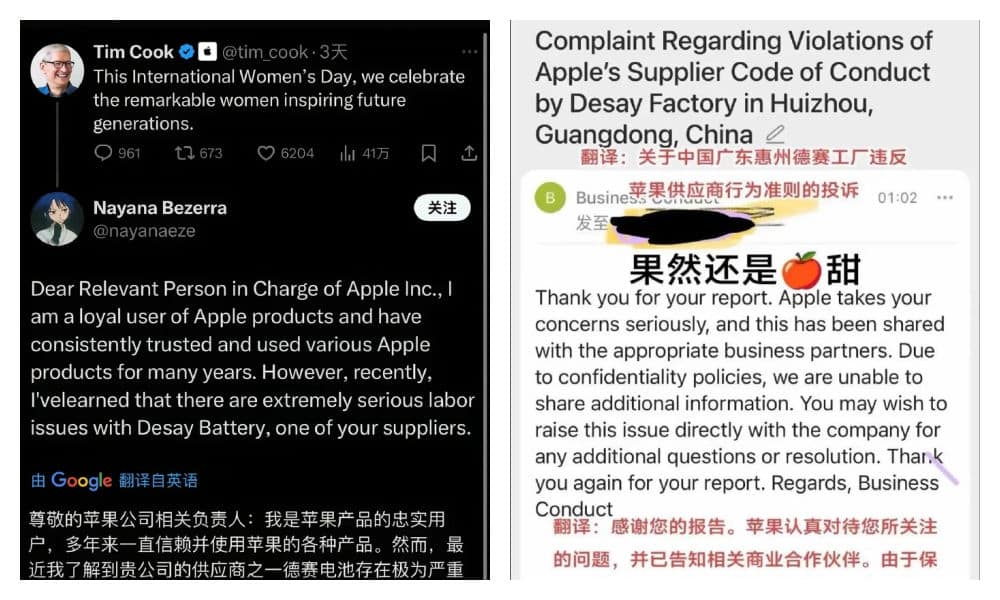
We include this content in the Weibo Watch newsletter. Subscribe to get it in your inbox 📩
Recently, Chinese netizens have started reaching out to Apple and its CEO Tim Cook in order to put pressure on a state-owned battery factory accused of violating labor laws.
The controversy involves the Huizhou factory of Desay Battery (德赛电池), known for producing lithium batteries for the high-end smartphone market, including Apple and Samsung. The factory caught netizens’ attention after a worker exposed in a video that his superiors were deducting three days of wages because he worked an 8-hour shift instead of the company’s “mandatory 10-hour on-duty.” Compulsory overtime violates China’s labor laws.
In response, the worker and other netizens started to let Apple know about the situation through email and social media, trying to put pressure on the factory by highlighting its position in the Apple supply chain. In at least one instance, Apple confirmed receipt of the complaint. (Meanwhile, on Tim Cook’s official Weibo account, the comment section underneath his most recent post is clearly being censored.)

Screenshot of replies on X underneath a post by Tim Cook on International Women’s Day.
The factory, however, has denied the allegations, , claiming that the video creator was spreading untruths and that they had reported him to authorities. His content has since also been removed. A staff member at Desay Battery maintained that they adhere to the 8-hour workday and appropriately compensate workers for overtime.
At the same time, Desay Battery issued an official statement, admitting to “management oversights regarding employee rights protection” (“保障员工权益的管理上存在疏漏”) and promising to do better in safeguarding employee rights.
One NetEase account (大风文字) suggested that for Chinese workers to effectively expose labor violations, reporting them to Western suppliers or EU regulators is an effective way to force domestic companies to respect labor laws.
Another commentary channel (上峰视点) was less optimistic about the effectiveness, arguing that companies like Apple would be quick to drop suppliers over product quality issues but more willing to turn a blind eye to labor violations—since cheap labor remains a key competitive advantage in Chinese manufacturing.
By Manya Koetse
(follow on X, LinkedIn, or Instagram)
Spotted a mistake or want to add something? Please let us know in comments below or email us. First-time commenters, please be patient – we will have to manually approve your comment before it appears.
©2025 Whatsonweibo. All rights reserved. Do not reproduce our content without permission – you can contact us at info@whatsonweibo.com.
Subscribe

Chinese New Nickname for Trump Mixes Fairy Tales with Tariff War

China Trending Week 15/16: Gu Ming Viral Collab, Maozi & Meigui Fallout, Datong Post-Engagement Rape Case

China Reacts: 3 Trending Hashtags Shaping the Tariff War Narrative

No Quiet Qingming: From High-Tech Tomb-Sweeping to IShowSpeed & the Seven China Streams

From Trade Crisis to Patriotic Push: Chinese Online Reactions to Trump’s Tariffs

“Dear Li Hua”: The TikTok/Xiaohongshu Honeymoon Explained

Beyond the Box Office: What’s Behind Ne Zha 2’s Success?

15 Years of Weibo: The Evolution of China’s Social Media Giant

Tuning Into the Year of the Snake

IShowSpeed in China: Streaming China’s Stories Well

TikTok Refugees, Xiaohongshu, and the Letters from Li Hua

The ‘China-chic Girl’ Image and the Realities of China’s Competitive Food Delivery Market

US-Russia Rapprochement and “Saint Zelensky”: Chinese Online Reactions to Trump’s Shake-Up

“Black Myth: Wukong”: From Gaming Screens to the CMG Spring Festival Gala?

Squat or Sit? China’s Great Toilet Debate and the Problem of Footprints on the Seat
Get in touch
Would you like to become a contributor, or do you have any tips or suggestions? Get in touch here!
Popular Reads
-

 China Insight11 months ago
China Insight11 months agoThe Tragic Story of “Fat Cat”: How a Chinese Gamer’s Suicide Went Viral
-

 China Digital11 months ago
China Digital11 months agoChina’s 2024 Gaokao Triggers Online Discussions on AI
-

 China Arts & Entertainment11 months ago
China Arts & Entertainment11 months agoSinging Competition or Patriotic Fight? Hunan TV’s ‘Singer 2024’ Stirs Nationalistic Sentiments
-

 China Brands, Marketing & Consumers12 months ago
China Brands, Marketing & Consumers12 months agoZara Dress Goes Viral in China for Resemblance to Haidilao Apron

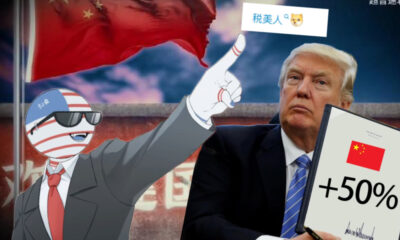



Chin CKit
January 10, 2021 at 7:04 am
Jack Ma the Chinese Mr. Bean.
Olivier VEROT
January 11, 2021 at 1:09 pm
great post @Manya.
Very interesting to see the fight between nationalist (and army of the propaganda) and the true fan of Jack Ma.
Jack is a real leader and inspire hundred of thousand of business men in China.
He is missing creating a real problem in the society…
The fight between billionaires and state.
slitherio
January 27, 2021 at 5:09 am
We’ll support you, teacher Ma, don’t give up!